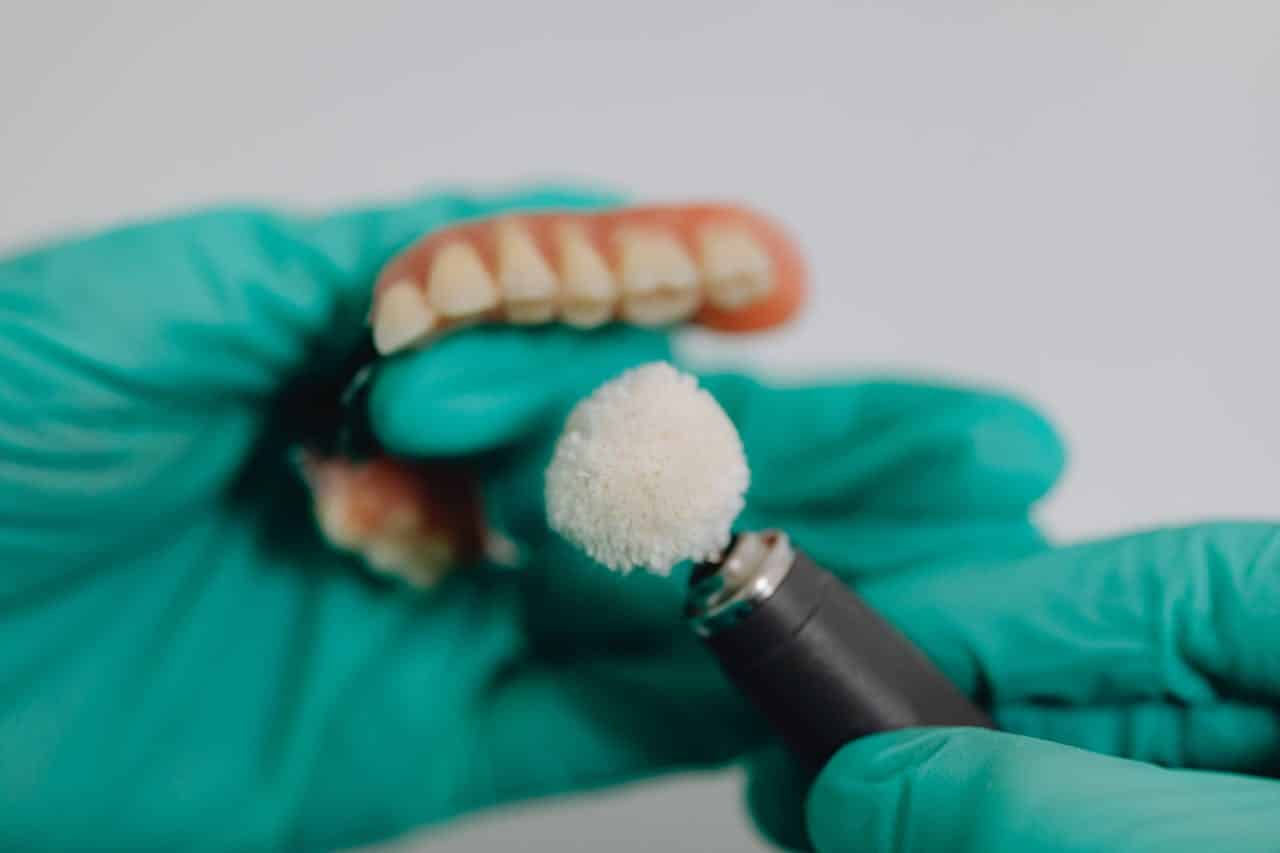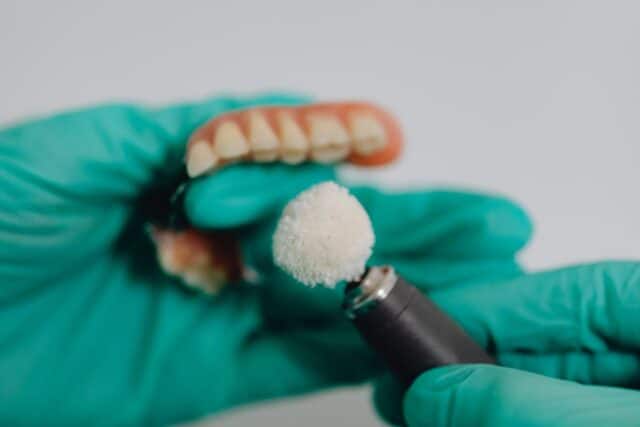
Like natural teeth, dentures require daily care to prevent staining, bad breath, and infections. Additionally, establishing a routine for cleaning dentures can help prolong their lifespan. Whether you’re new to dentures or have been wearing them for years, learning how to clean dentures properly will help keep your smile bright and your mouth healthy.
Why Denture Care Matters
Neglecting proper denture care can result in a range of oral health issues. Like natural teeth, dentures can accumulate plaque, a thin film of bacteria that may result in staining, discoloration, and odor. If plaque is allowed to build up, it can harden into tartar. This can increase the risk of oral infections, including stomatitis, which causes painful inflammation in the mouth.
Poor denture hygiene may also lead to gum irritation or fungal infections, such as oral thrush. By keeping your dentures clean, you reduce the likelihood of these complications and ensure that your dentures stay comfortable and functional.
What Is the Best Way to Clean Dentures?
Several cleaning methods work well for dentures; the best depends on your oral health needs and personal preferences. Below is a typical daily cleaning routine and a few weekly care tips to help you keep your dentures in excellent condition.
Daily Cleaning Routine for Dentures
Step 1: Remove and Rinse Dentures After Eating
After each meal, remove your dentures and rinse them under cool running water. Getting into this habit helps wash away food particles that can lead to plaque buildup and bad breath.
Step 2: Brushing Dentures
Gently brush all surfaces of your dentures with a soft-bristled toothbrush and a non-abrasive denture cleaner. Avoid regular toothpaste, which can be too abrasive and cause scratches on the denture material. These scratches can harbor bacteria and lead to further problems. Brushing your dentures thoroughly daily helps remove plaque, food debris, and bacteria, keeping them fresh and clean.
Step 3: Soaking Dentures Overnight
Dentures must stay moist to maintain their shape, so soak them in a denture-cleaning solution overnight. This will help disinfect the dentures and prevent them from drying out. Be sure to follow the instructions on the denture cleaning solution, as some products are designed for overnight soaking, while others may require shorter soaking times.
Weekly Care for Dentures
Deep Clean Once a Week
In addition to daily cleaning, giving your dentures a deeper clean at least once weekly is important. Use a denture cleaning tablet or solution that targets tough stains and the buildup of bacteria.
Check for Damage
Regular inspection of your dentures is crucial for spotting cracks, chips, or changes in fit. If you notice damage, consult your dentist for adjustments or repairs.
It’s also important to take care of your gums and tongue, even if you don’t have any natural teeth left. Use a soft-bristled toothbrush to clean your gums and tongue twice a day. This helps remove food debris and thus prevents gum disease. You can also use mouthwash to reduce harmful bacteria in your mouth and keep your breath fresh.
Choosing the Right Denture Cleaning Products
When selecting products for cleaning dentures, it’s important to choose ones that are both effective and safe. Look for products with the American Dental Association (ADA) seal, as they meet stringent safety and quality standards. Here are some options to consider:
- Denture Cleansers: These come in the form of tablets, powders, or liquids. They are specifically designed to remove stains, bacteria, and odors without being too harsh on the denture material.
- Denture Soaking Solutions: These solutions are made for overnight soaking and deep cleaning. They help keep dentures clean and disinfected.
- Denture Brushes: A soft-bristle brush designed for dentures is a must. These brushes thoroughly clean dentures without scratching the surface.
- Ultrasonic Cleaners: These are small devices that use sound waves to remove debris from dentures. They can be a helpful tool for maintaining cleanliness, but should not replace daily brushing.
- Enzyme-Based Cleaners: These contain enzymes that break down protein deposits on dentures, making them a viable option for cleaning tough stains.
Always read and follow the instructions on cleaning products for dentures to ensure you’re using them properly and safely.
Special Tips for Partial Dentures
Partial dentures, which are designed to work alongside natural teeth, require a bit more attention. In addition to cleaning the dentures themselves, you’ll need to take extra care of the natural teeth surrounding them.
Plaque can accumulate around the clasps of partial dentures, leading to cavities or gum disease. Be sure to brush your natural teeth with fluoride toothpaste and floss regularly to prevent damage.
How to Clean Dentures with a Soft Liner
Soft liners are cushioned materials added to dentures for extra comfort. If your dentures have a soft liner, avoid soaking them in regular denture cleaning solutions, as these can degrade the liner.
Instead, gently brush the dentures with water and a soft-bristle brush. If you’re unsure how to care for dentures with soft liners, consult your dentist for personalized advice.
What to Avoid When Cleaning Dentures
Certain products and habits can damage your dentures. Avoid using hot water, which can warp the denture material and affect the fit.
Similarly, regular toothpaste, baking soda, and abrasive cleaners can scratch the surface, making it easier for bacteria to grow. Steer clear of sharp objects or stiff brushes, as these can cause cracks or wear down the dentures over time.

When to Seek Professional Cleaning
While daily and weekly at-home care is essential, regular professional cleaning is still necessary. A dentist can remove stubborn stains and tartar that regular cleaning may miss.
It’s also essential to have regular dental checkups to ensure that your dentures fit properly and your mouth stays healthy. If you notice discomfort, changes in fit, visible damage, or any worrisome symptoms, it’s a good idea to schedule an appointment with a trusted dental professional.








